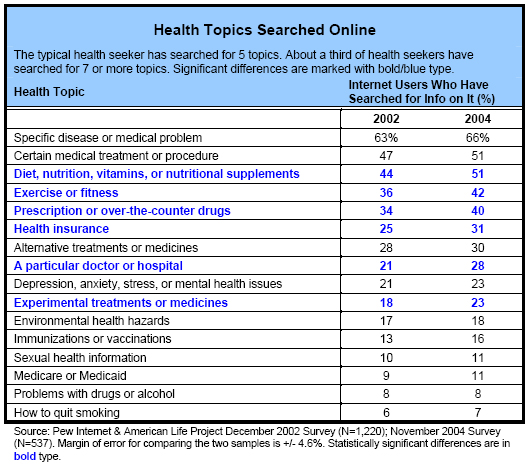Eight in ten internet users have looked for health information online, with increased interest in diet, fitness, drugs, health insurance, experimental treatments, and particular doctors and hospitals
Online health searches expand in areas like diet, fitness, and drug information.
When it comes to online health searches, specific diseases and treatments continue to be the most popular topics. But the greatest growth is in seeking information about doctors and hospitals, experimental treatments, health insurance, medicines, fitness, and nutrition.

Eight in ten internet users have looked online for health information.
Seventy-nine percent of internet users have searched online for information on at least one major health topic, statistically the same portion (80%) as the Pew Internet & American Life Project found in 2002. That translates to about 95 million American adults (18+) who use the internet to find health information.
Speed of access and years of online experience are among the key trends that may influence online health searching.
There are many reasons why internet users might now be more likely to search for certain types of health information. Many health-related Web sites are supplying more content and that might be driving users toward certain topics. Government agencies’ call for obesity awareness and public education about nutrition may be increasing public awareness and prompting more traffic. The pharmaceutical industry’s marketing campaigns may be paying off in increased interest in their products. More Americans may be looking for good deals on health insurance or checking up on their hospital’s quality ratings online. The interest in experimental treatments may be growing as internet users become aware of the possibilities available to them.
As in 2002, certain groups of internet users are the most likely to have sought health information online: women, internet users younger than 65, college graduates, those with more online experience, and those with broadband access.
Two ongoing trends in the internet population may reinforce some users’ greater tendency to seek out certain health information online. There are now many more internet users with high-speed or broadband access at home. Those who have high-speed connections are, in many cases, more likely than those with dial-up connections to have sought various kinds of health information online. Additionally, there are many more internet users with six or more years of online experience. These “power users” may now turn to the internet not only when they have a pressing concern, but when they have an every-day sort of health questions about diet, fitness, or how to check if something is covered by their health insurance.



